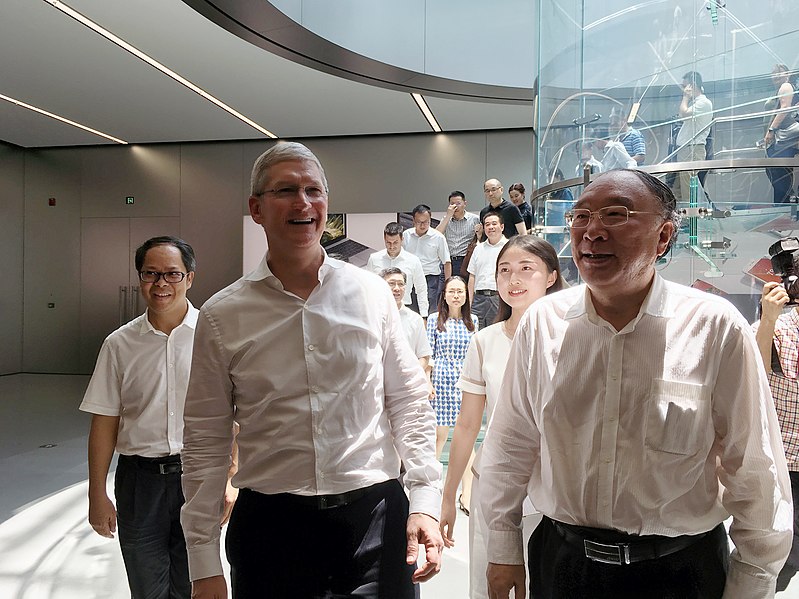Why There Are No Layoffs At Apple Computer
You may have read about all of the layoffs in the Tech Industry. Most industry leaders have begun sending pink slips to their workers to cut costs. Conspicuously absent has been Apple Computer, which, to date, has not let go of anyone.
Here may be one reason why.
We're all familiar with the "Supply Chain." That is the series of steps from a production facility, usually in Asia, to the end user, usually in America. Its process began in the 1950s when labels that read "made in Japan" began to appear. Back then, we considered such items an oddity. Didn't American factories make all that Americans could want? That was the thinking at the time.
Offshore production dominates many American markets, such as pharmaceutical compounding, electronics production, and specific auto segments. Over the years, Americans have become increasingly accustomed to these overseas products, and now we couldn't live without them. Over the past several years, America has purchased from its overseas' suppliers $800 billion to $1 trillion more in overseas goods than we sold to them.
The most widely recognized of all these offshore products are the phones, personal computers, and other electronics produced by Apple Computer, one of the world's largest multinational companies. In the Apple business model, product design and marketing occur in their offices in America, while manufacturing, or to use Apple's term, "assembly," happens in Asia.
The iPhone is the most profitable and famous of all Apple products. And it's the iPhone that provides the best insight into Apple's Business Model. The iPhone was designed by John Ivy and his team in the early 2000s and first came to market in 2007. Sleek, simple, and straightforward, the iPhone took the American market by storm.
Since its very beginning, it has been the dominant smartphone. The loyal customers for this product are legion, and I'm sure you know, as I do, several friends or family who must have the latest model each time a new iPhone is released.
We've just described the sum total of the America-based portion of Apple. Design and marketing, that's it. Think about the incredible leverage here. Just a relatively few people are working in the US. Apple administration and management, the Marketing Department, and the Design Department. I'm discounting the employees at those Apple Stores. They do add headcount. But they are not an essential part of the Apple Business Model and came into Apple's strategic business plan relatively recently.
Overall, Apple has one of the lowest corporate profiles of any major corporation. By any measure, the number of American-based workers is minimal compared to the sheer amount of business Apple conducts each year.
Because of these relatively few American-based workers, Apple has yet to appear on the list of high-tech companies laying off people. The short answer, the vast number of workers who assemble the iPhones don't work for Apple. Shocking, I know.
Professor Yige Dong, at the State University of New York in Buffalo, has called the way Apple assembles the iPhone "gig manufacturing." It's a concept similar to what we call an "independent contractor." Here, in the States, we're only a temporary employer when we hire a plumber or repair man. The plumber or repairman agrees to perform a specific task, and we pay them a stipulated payment for the job.
That's precisely how most of the workers for Apple work. Only they work for a company other than Apple, an intermediate. The largest iPhone Factory in the world is in the city of Zhengzhou, China. The plant takes up over 5,000 square kilometers and employs thousands upon thousands of workers. It makes more iPhones than any other plant, yet it's not an Apple Plant. The plant is owned and run by Foxconn, a Taiwanese company that contracts with Apple to manufacture iPhones.
Taking it one step further, the workers at that iPhone Plant don't work for Foxconn. Instead, they are independent contractors, those Gig Workers Professor Dong discusses. They come to the plant, do their closely watched task, and are paid monthly. The average compensation at this iPhone plant is $324 a month.
Because iPhone sales are highly seasonable, most sales occur in the three months around the year-end holidays; many workers are turned away after the high-sales period.
Remember, these are not layoffs; they are simply gig workers who no longer have work to do. And besides, this isn't Apple letting them go; it's Foxconn.
Apple has discovered the way around all those American rules, regulations, and benefits. There are no unemployment benefits for gig workers, little or no insurance, no OSHA, no Union, no Retirement Fund, and on and on.
Apple, Nike, and most American multinationals have devised a virtual manufacturing process. Components and raw materials are "assembled" in an alien plant, where jobs and management are outside the watchful eyes of American regulators and the American public. It is a remarkable construct of which most of us are unaware.
And it is the reason that Apple may not lay off anyone.



